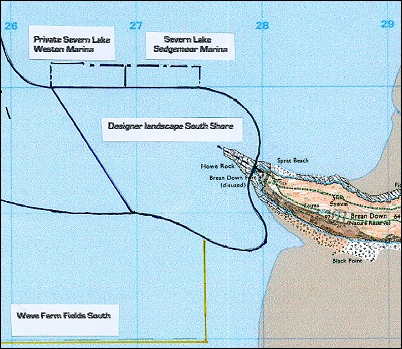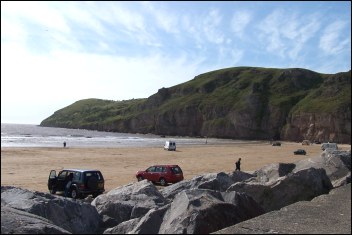Plans for a ten-mile barrage across the River Severn, from Brean Down to Wales, moved closer this week with the appointment of an American engineering company to study the proposals.
Parsons Brinckerhoff, the company that built New York City’s first subway system, will head a two-year assessment of the project, which is expected to cost up to £15billion and could take a decade to complete.
Pricewaterhouse Coopers is also to advise the Government on financing and ownership options, according to a statement from the Department for Business, Enterprise and Regulatory Reform.
The Parsons Brinckerhoff-led group will examine the scheme’s environmental impact and explore two main technologies — a conventional barrage, running between the English and Welsh coasts, and a tidal lagoon. Both would harness the enormous tidal range of the Severn, which at 14 metres is the second-highest in the world, to drive electricity-generating turbines.
A conventional barrage could be built at various locations, although a study in 1989 recommended one running ten miles between Lavernock Point, near Cardiff, to Brean Down (pictured) near Burnham-On-Sea. This would have a capacity of 8,640MW and an estimated output of 17 terawatt hours a year — providing about 5 per cent of present UK electricity demand.
 The alternative, a tidal lagoon, would need an artificial lake in an area of shallow water with a high tidal range. It would fill during a rising tide, gradually releasing the water afterwards to drive turbines. This would probably be a smaller scheme generating less power, but it might have a less damaging environmental impact.
The alternative, a tidal lagoon, would need an artificial lake in an area of shallow water with a high tidal range. It would fill during a rising tide, gradually releasing the water afterwards to drive turbines. This would probably be a smaller scheme generating less power, but it might have a less damaging environmental impact.
John Hutton, the Energy Secretary, said: “A Severn tidal power project could be larger in size, output and cost than any other energy project in this country. It’s therefore vitally important that we undertake the most thorough and exhaustive study and contract the right companies.“
According to the Sustainable Development Commission, a barrage across the Severn would produce clean and sustainable electricity for 120 years. It could have other uses, such as supporting a high-speed rail or road bridge.
However, opponents include Friends of the Earth and the RSPB, despite the project’s green credentials. It would threaten the welfare of migratory fish and destroy tidal flats and saltmarsh, damaging the habitat of rare birds including the shelduck, teal, pintail, dunlin and redshank – they claim.
The Parsons Brinckerhoff-led consortium includes Black & Veatch, ABPmer, HR Wallingford, Hartley Anderson and George Corderoy
RELATED LINKS:
![]() Barrage boss visits Burnham to hear all sides of the debate
Barrage boss visits Burnham to hear all sides of the debate
![]() Severn Barrage ‘must not be driven by profit’ says green group
Severn Barrage ‘must not be driven by profit’ says green group
![]() Government announces fresh study into barrage feasibility
Government announces fresh study into barrage feasibility
![]() Barrage plans ‘not affected by bid for conservation status’
Barrage plans ‘not affected by bid for conservation status’
![]() Entrepreneur ‘humbled’ by positive feedback about barrage
Entrepreneur ‘humbled’ by positive feedback about barrage
![]() Barrage company invites expressions of interest
Barrage company invites expressions of interest
![]() Severn Barrage ‘could cause flooding in Burnham area’
Severn Barrage ‘could cause flooding in Burnham area’
![]() Route of proposed Severn Barrage revealed
Route of proposed Severn Barrage revealed
![]() New group comes forward with alternative barrage plan
New group comes forward with alternative barrage plan
![]() Green Party has ‘deep misgivings’ about barrage plans
Green Party has ‘deep misgivings’ about barrage plans
![]() Severn Barrage proposals referred to DTI
Severn Barrage proposals referred to DTI
![]() Huge £650million Severn Barrage plan unveiled
Huge £650million Severn Barrage plan unveiled
![]() Official Severn Lake Website [External Link]
Official Severn Lake Website [External Link]







